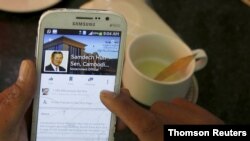Cambodian Prime Minister Hun Sen's Facebook account was reactivated Thursday, three weeks after he announced he was forsaking the social media giant in favor of posting on Telegram, a popular messaging app that also serves as a blogging tool.
Hun Sen's return to the Facebook fold came three days before a general election in which his ruling Cambodian People's Party is virtually guaranteed a landslide victory.
Hun Sen said at the end of June that he would stop posting new material on his Facebook page but leave the account online. He said he was switching to Telegram because he believed the app provided a more effective way to communicate.
But when a Facebook watchdog criticized the language in one of his videos and recommended suspending the prime minister's account for six months, Hun Sen took down the page.
Duong Dara, who manages the 70-year-old leader's social media accounts, posted a message Thursday saying he had asked Hun Sen to be allowed to reactivate his Facebook page in the national interest. He said he, and not the prime minister, would be uploading content.
Hun Sen, who has led Cambodia for 38 years, had used Facebook since 2015 to display family snapshots, issue dire warnings to his political enemies, and broadcast live his frequent and often lengthy speeches.
His page boasts 14 million followers, though critics have suggested a large number are "ghost" accounts purchased in bulk from so-called "click farms," an assertion Hun Sen has repeatedly denied.
As of Thursday, Hun Sen's Telegram account had almost 987,000 subscribers, up from the 855,000 he had when he announced his June breakup with Facebook.
Hun Sen announced his intention to cease posting on Facebook a day before a quasi-independent review board established by the platform's parent company, Meta, recommended the six-month suspension of both the prime minister's Facebook and Instagram accounts.
The oversight board concluded he had used language that could incite violence in a video of a January speech in which he decried opposition politicians who accused his party of stealing votes.
The board said it reached its nonbinding recommendation due in part to "Hun Sen's history of committing human rights violations and intimidating political opponents, as well as his strategic use of social media to amplify such threats."
Separately, it overturned a ruling by Facebook's moderators to allow the video, originally broadcast live, to stay online. Within hours of the board making its report public, Hun Sen's Facebook page was removed.




